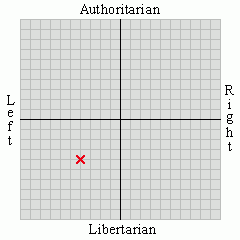Does anyone else find themselves pathologically incapable of answering multiple-choice opinion questions? I just tried taking the “Political Spectrum” quiz that I keep seeing on Facebook. I can’t get past question 3, though:
In nearly every instance, the free market allocates resources most efficiently.
In a considerable majority, I agree emphatically. In a small-but-really-important minority of the time, the free market does a horrendous job, and it’s very important for government to intervene to keep the train on the tracks.
The question sort of appears to say what I’m saying, but not quite. If I agree, it sounds like I’m saying that laissez-faire economics almost always works. The exceptions are too notable to brush off, though. But if I disagree, it sounds like I support a Communist-style central control model, which would be even worse.
So instead, I answered “Neutral” and marked the issue of extremely low importance. That’s not right, either: it seems to make it seem that I’m apathetic about the economy.
I think I tend to spend way too much time looking into how questions will be interpreted, and how they might impact the results, rather than answering from my gut. I didn’t do it on standardized tests since it would muck up the works, but on tests in school, I periodically found myself writing comments on multiple choice questions. On one Physics exam or something or the sort, I wrote in, “This assumes the question refers to the atmosphere on Earth,” which not all questions did. Multiple choice questions shouldn’t leave me making assumptions.
Consider Question 50: “A person’s morality is between that person and God only. Government should not get involved.” I really, really want to write in, “If, and only if, their behavior does not harm others.” If we’re talking morality in terms of what someone does in a bedroom or the type of language they use, government should absolutely be kept away. But I tend to think that not going around lopping everyone’s head off with a machete is moral behavior, and the government is rather involved in restricting that practice. Government should enact laws that keep people safe. Many of those laws may reflect the society’s morals, but only to the extent that they actually serve the best interest of the people.
I’d be interested in watching someone else take this. There are some questions where I waffled. After seeing some of the blatant lies presented by some political activists on their talk shows, “Radio stations should be required to present balanced news coverage.” sounded like a good idea. I leaned towards yes. But “balanced” in whose eyes? The far-right hated “MSM” (mainstream media, a favorite target of extremists on both sides, and maybe people with brains on both sides, too) because it did nothing but attack the President and ignore their conspiracy theories about Obama being a Satanic Freemason. The far-left hated the same MSM at the same time because it wasn’t critical enough of the President and the wars, and because it kept showing Obama with the caption “Osama bin Laden.” You can’t really legislate “balanced.” Plus, there’s that whole First Amendment that suggests that this effort would be incredibly unconstitutional. So I spent a long time mulling this survey question. Others (“If our leader meets with our enemies, it makes us appear weak.”) had intuitive answers that I chose without any thought, because I already knew the answer.
And interestingly, I’m finding that the questions that hint at contemporary political issues are ones that I mark as being very important, while the Ivory Tower questions are of low importance to me.
Of course, other questions just stump me. “It is wrong to enforce moral behavior through the law because this infringes upon an individual’s freedom.” Not killing people is moral behavior, and a law against that doesn’t trample individual freedoms. On the other hand, things like laws against same-sex couples or interracial marriages were sometimes thought of as “morals,” and those definitely don’t belong as laws. It’s too vague of a question to really be able to answer.
And here’s a perfect example of the questions I think too much about: “Whatever maximizes economic growth is good for the people.” I ended up disagreeing strongly, because economic growth shouldn’t be the primary driver. (For example, people dumping nuclear waste into the water supply would save companies lots of money on waste disposal and lead to economic growth, but it would kill people in the long run. And probably short term, too.) But I worry that this answer leaves open the implication that economic growth is not important, and that I’m more focused on adding regulation than having growth.
Oh, and “The lower the taxes, the better off we all are” is another one. On some level I agree, but I think the real metric is what we’re getting for those services. If we had anarchy, we would have a 0% tax rate, but perhaps absolute mayhem, too. I can’t answer this question as-is.
I get the psychology of why some questions are asked, but they’re not really about politics. “It is a problem when young people display a lack of respect for authority.” I think it’s normal and I think it perhaps ties into a healthy distrust of authority, more or less an important principle of democracy. But what does it have to do with politics?
The results didn’t really surprise me:




